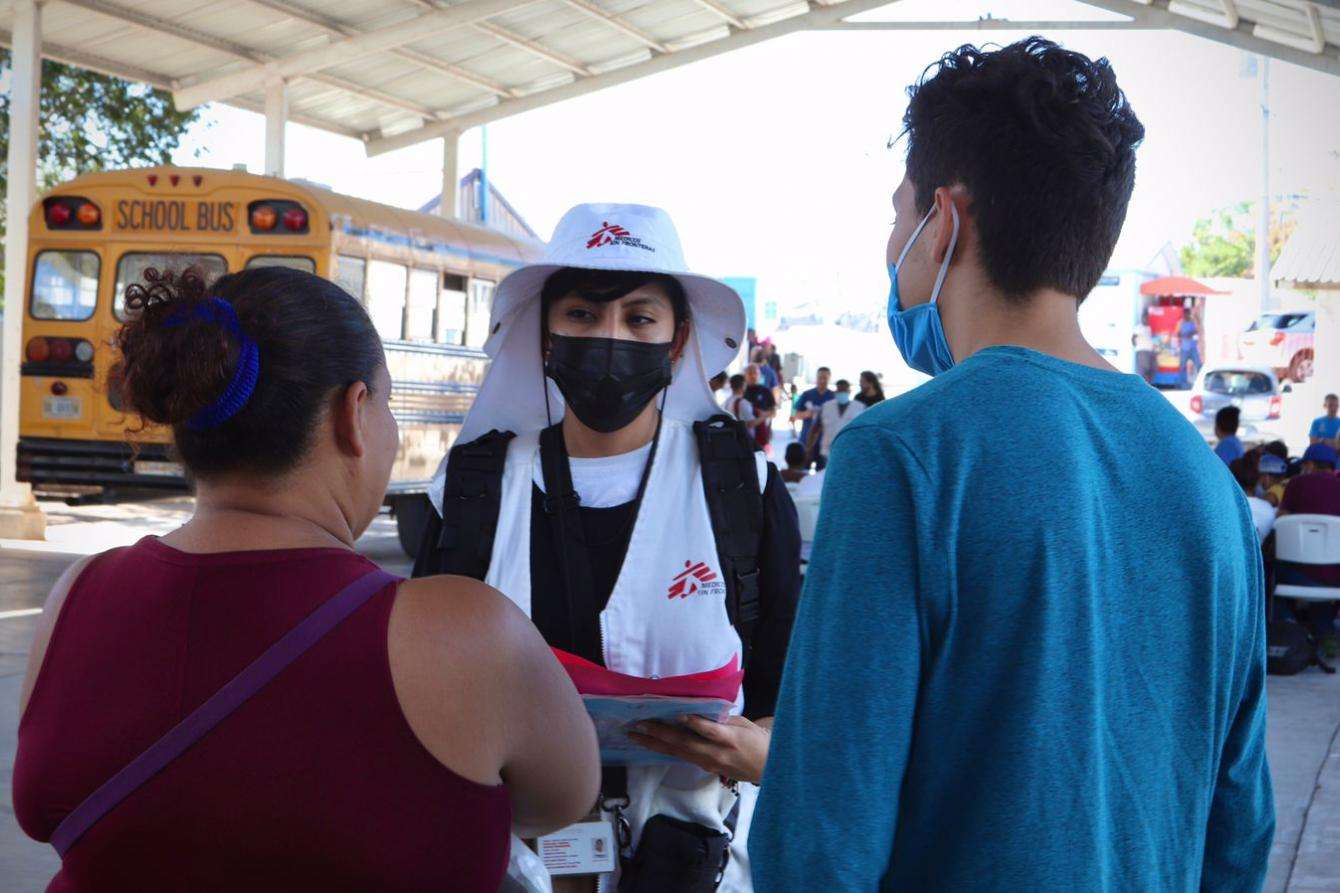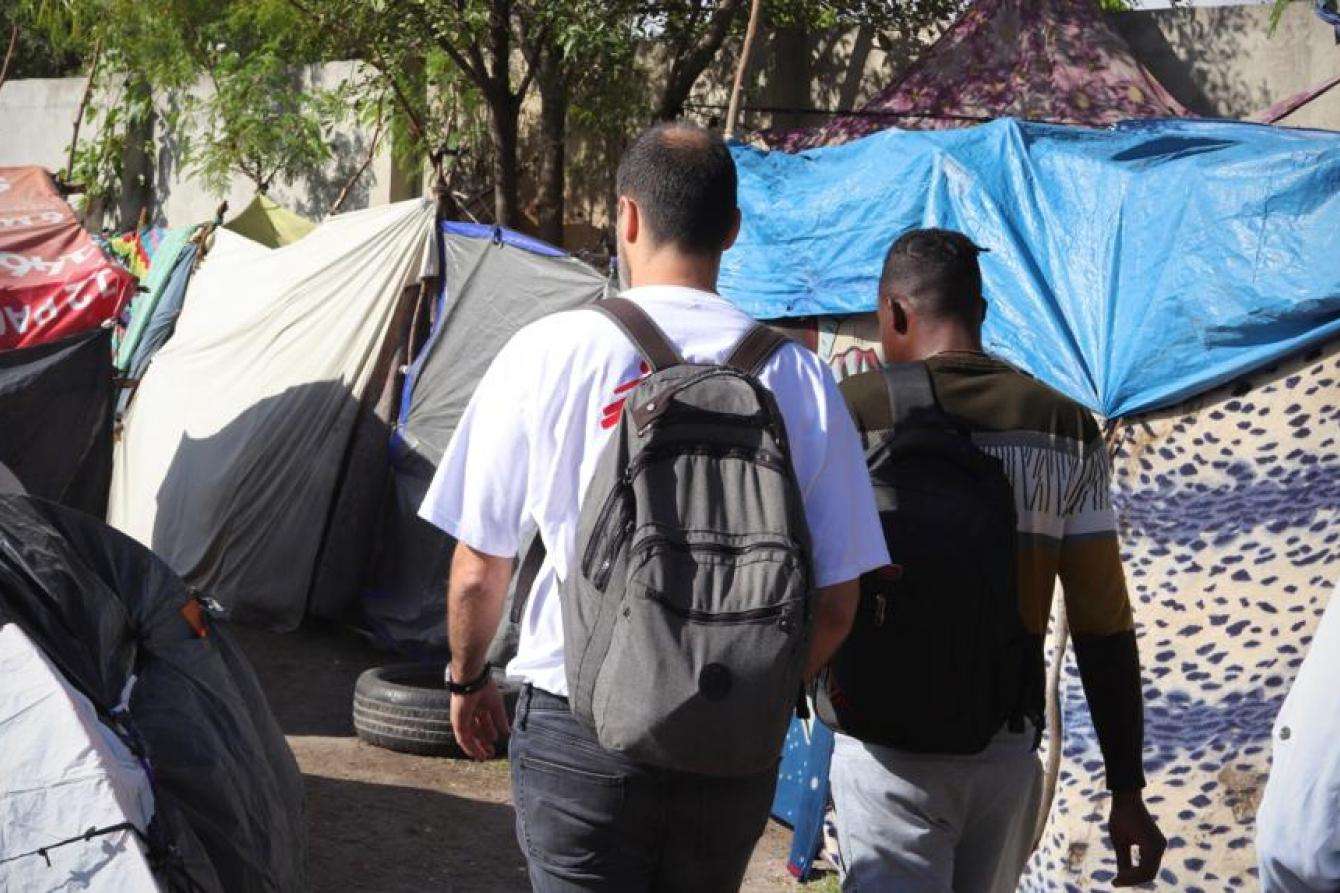In Mexico, Doctors Without Borders/Médecins Sans Frontières (MSF) supports communities affected by violence and a growing number of refugees and migrants traveling within the country in search of safety. After being forced from their homes due to extreme violence or poverty in their home countries, many have experienced ill treatment and a lack of access to medical care and basic services like proper shelter along their journeys north.
MSF teams provide humanitarian aid, medical services, and mental health support to people at various points along the migration route through Mexico. We have also been advocating for the termination of harmful policies like Title 42, a US public health order that has been misused during the COVID-19 pandemic to effectively block access to asylum. People seeking asylum in the US have been sent back to Mexico or to their countries of origin without due process. While a federal judge ordered the Biden administration to stop using this policy yesterday, we are calling on the US to commit to permanently ending this harmful policy and ensuring people's safety at the border. Shortly before this court ruling, the Biden administration had expanded Title 42 to include Venezuelans.
MSF International President Dr. Christos Christou visited Mexico earlier this month and describes his experience.
1. What did you see while visiting MSF’s projects in Mexico?
The primary objective of my visit was to understand and see firsthand what was happening there in the places where we provide primary health care and mental health support.
During my time in Mexico, I visited our Comprehensive Care Center [known by its Spanish acronym El CAI] in Mexico City that helps people—mostly migrants—who have experienced [torture and] ill treatment. In the past, we used to call the people here victims of torture. But now we want to empower these people who have been victims but have survived. Here, I saw families, including little kids, who have experienced a lot of trauma, including sexual violence and torture during their journeys towards safety.
Then I had the opportunity to visit Reynosa—an infamous place on the border with the US, where, these days, we see thousands of people, including families, single adults, and little kids without a place to sleep, access to basic health services, clean water, or adequate hygiene conditions. The very few shelters there have limited capacity and cannot accommodate everyone. So there are people piling up outside the shelters.
Groups of refugees and migrants have also [gathered] in other urban centers in the country, many of them in the south. That’s why MSF is expanding activities in the south, including in places where we were not working before, like San Pedro Tapanatepec. This small town has received a few thousand migrants over the last few weeks. In many places across the country, there aren’t many or any groups providing aid because of security concerns or a lack of funding.

2. Why are we seeing more refugees and migrants in the south of Mexico?
Part of the reason is, of course, the expansion of Title 42 in the US that pushed back more people. So far it has been expanded for Venezuelans, but we don’t know who may be next if it isn't permanently ended. The US government expanded the application of Title 42 to Venezuelans on October 12. Many Venezuelans who had reached the US border or were still on the move at that time were suddenly either trapped in place or put on buses and sent away from the border. That change in practice on the US side resulted in people [massing] at various points across Mexico—as well as further down the migration route—including in locations where basic services are lacking and humanitarian actors are just not present.
There’s also so much confusion with the US asylum-seeking processes. People really don’t understand where they have to be, what the process is, and what to expect next as their cases move forward—so they end up missing key meetings and deadlines. Plus, the same rules don’t always apply to all people or groups. For example, more than 20,000 Ukrainians were allowed to enter the US from Mexico between March and the end of April after being granted exemption from Title 42 while the border remained closed to people fleeing violence and conflict in Haiti, Colombia, and Honduras.
3. What stories from your time in Mexico have stuck with you the most?
I met a young man named Faniel. He arrived from Haiti more than two months ago after he was being extorted by gangs at home just to let his 7-year-old son go to school. We know Haiti and what it looks like today. It’s a completely chaotic situation. He felt that he had to flee. He told me his concern at the border was not how to cross but where he would be able to sleep safely at night.
These are the stories we hear from people. Of course, they carry physical and mental traumas, but they are also neglected and deliberately being put to the side.

4. How do MSF’s projects in Mexico compare to those serving other refugee and migrant communities?
I come from Greece, and I’ve been really involved in monitoring the situation there since the reception crisis in 2016. But my work on this [migration] issue goes back to when I first started with MSF in 2002.
Since 2016, we’ve seen the European Union’s policies not just penalizing those who provide humanitarian aid, but also trying to punish those people fleeing for safety. EU lawmakers have created inhumane detention centers. They think that by pushing back refugees, migrants, and asylum seekers from the Middle East and Africa—or by making their lives hell upon arrival in Europe—this will discourage them. We have insisted for years that this does not work. Unfortunately we were right, because what we see is that people keep taking tough decisions to make dangerous journeys. They make these journeys because they don’t have any other options.
With Ukraine, we have seen such amazing solidarity by everyone worldwide expressed to people fleeing the war there. We would like to see that for everybody. We really don’t understand what the difference is, or why it’s seen as legitimate for certain people to flee unsafe communities or seek asylum while it’s not for others.
5. You met with government officials in Mexico and the US following your trip. What did you tell them?
People and lawmakers need to know that our fellow human beings are seeking safety, and they will keep seeking safety regardless of policies that are put in place to deter them.
Our ask for refugees and migrants in Mexico—and everywhere—is not about blindly opening the doors to everybody. We are advocating for decent and humane conditions, fair migration and asylum-seeking processes, and for people to be treated as human beings rather than as 'invaders' or threats.
As MSF, we are extremely concerned about the humanitarian consequences of the policies that states all over the world are following these days, including Title 42 and the former so-called Migrant Protection Protocols (MPP) program, which had forced thousands of asylum seekers to remain in Mexico while waiting for their protection claims to be considered by the US.
Policies like these seem to approach migration as a security threat rather than as a basic human act [for survival]. As long as this is happening, we will keep standing by people to alleviate their suffering and ensure their dignity.

